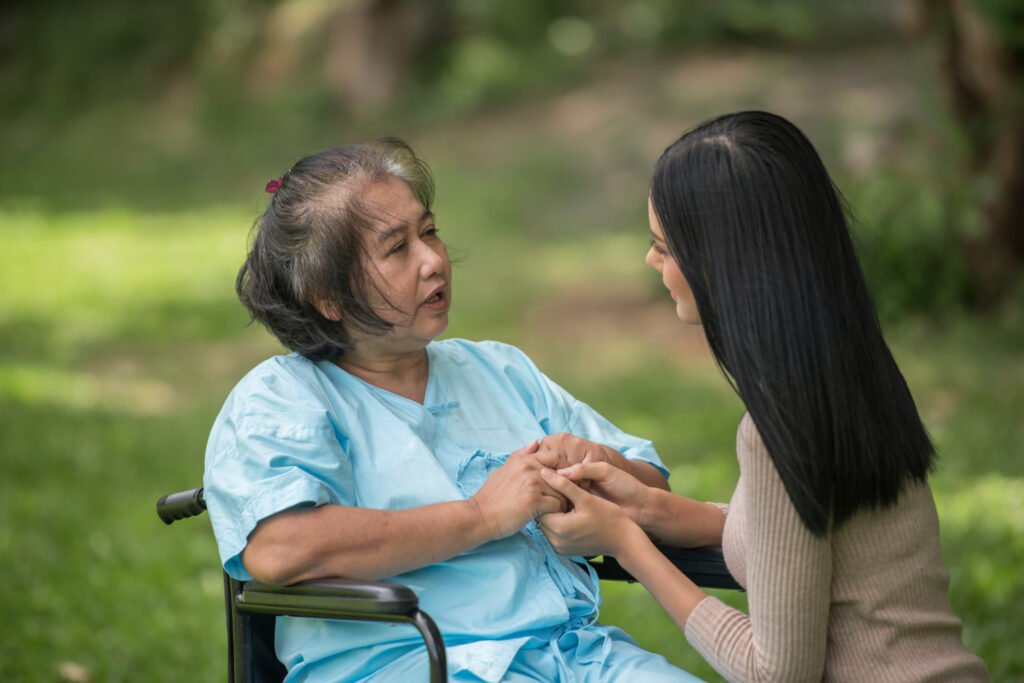
Being a caregiver means showing love, patience, and strength. But it doesn’t mean you have to say yes to everything. Many caregivers try to do it all — and end up feeling tired, frustrated or even sick. Saying “no” can feel scary, but it’s a powerful act of self-care.
Setting healthy boundaries helps you stay strong, so you can give care without losing yourself. It’s not rude or selfish. In fact, it’s one of the most loving things you can do for yourself and the person you’re helping.
When you say no to taking on additional caregiving duties, you aren’t being mean. You’re being realistic.
Why Caregivers Need Boundaries
Caregiving is a full-time emotional and physical job. It can wear you down if you don’t take breaks or ask for help.
Here are some signs that you might need to set stronger boundaries:
- Feeling tired all the time
- Often feeling angry, resentful or sad
- Having no time for your own needs
- Saying “yes” even when you don’t want to
- Relationships outside of caregiving are suffering
Without boundaries, caregiving can lead to burnout. This can hurt your mental health, your relationships and even your ability to keep caring for your loved one.
Healthy boundaries help you:
- Stay balanced and calm.
- Protect your physical and mental health.
- Set realistic expectations with others.
- Avoid resentment and guilt.
One doctor who became a caregiver for a family member learned this. She says, “it takes a lot of work to resolve the tension between feelings of responsibility.” That’s because caregiving responsibilities often conflict with one another.
Learn more about protecting your mental health by setting boundaries.
Key Takeaway: Boundaries help you protect your time, health and energy so you can keep giving care without losing yourself.
How to Say No With Confidence and Kindness

Saying no doesn’t have to be mean or cold. You can speak with both honesty and care. Many caregivers feel guilty turning someone down, but guilt often comes from the fear of being judged.
To say no with confidence, try these simple tips:
- Use “I” statements. They could sound something like: “I’m feeling overwhelmed and need to rest tonight.”
- Be direct but gentle. An example of the direct approach is: “I’m not able to do that today, but maybe someone else can help.”
- Set limits early. Don’t wait until you’re at a breaking point. Say something early like, “I can help with doctor visits, but I can’t do errands every day.”
- Repeat if needed. Boundaries take time. It’s okay to say no more than once. Stay firm and calm.
- Let go of guilt. Guilt is a feeling, not a fact. Remind yourself that caring for you is also important.
Discover more strategies that can help you say no.
Know when to ask for help.
You don’t have to do it all alone. It’s okay to delegate tasks like:
- Grocery shopping
- Cleaning or yard work
- Rides to appointments
- Picking up medicine
Know who to ask for help.
Besides family members, think about asking others like:
- Friends
- Neighbors
- Local caregiver support groups
- Community resources like respite care
Key Takeaway: Saying “no” is a way to protect your peace and share the caregiving load.
Create a routine that supports boundaries.
Once you start saying no, it’s important to build a routine that supports your new boundaries. You need time to recharge, reflect and enjoy life outside of caregiving.
Start by identifying your “non-negotiables.”

These are things and activities that help you feel good and stay healthy.
- Daily walk or stretch
- Quiet coffee time in the morning
- One night off each week
- Regular sleep and meals
- Connecting with a friend
You might find it helpful to put these on your calendar just like you would any other appointment.
Check in with yourself regularly.
You can assess your needs by periodically asking yourself questions like:
- How am I feeling today?
- Am I getting enough rest?
- Are my boundaries being respected?
- Do I need to adjust anything?
Also, expect some trial and error. Boundaries may change as caregiving needs shift. Stay flexible, but firm with what you need.
Key Takeaway: A clear routine makes it easier to keep boundaries strong and reduce daily stress.
Deciding on Your Next Steps

Being a family caregiver is a responsible role. But you don’t have to carry everything alone. Setting boundaries and asking for help when you need it are what make long-term caregiving possible.
Here’s what you can do starting today:
- Write down three things you need to protect your health.
- Practice saying “no” to one non-essential task this week.
- Talk to a friend or support group about your new boundaries.
- Reach out to local resources for help and backup care.
You are doing important work and you deserve to be cared for, too.
Key Takeaway: Don’t think of boundaries as walls. Look at them as bridges to healthier caregiving for everyone involved.
Setting Caregiving Boundaries FAQ
Is it okay to say no even if my loved one gets upset?
Yes. Emotions are natural, but your well-being matters too.
How do I deal with people who don’t respect my boundaries?
Repeat your limit calmly. Consistency builds understanding.
What if I feel guilty afterward?
Acknowledge the guilt, but don’t let it lead your decisions. Guilt fades, burnout doesn’t.
Can boundaries help with time management?
Absolutely. Saying no to non-essentials frees time for what matters most.
Where can I find help as a caregiver?
Local support groups, healthcare providers, and online communities are great starting points.








